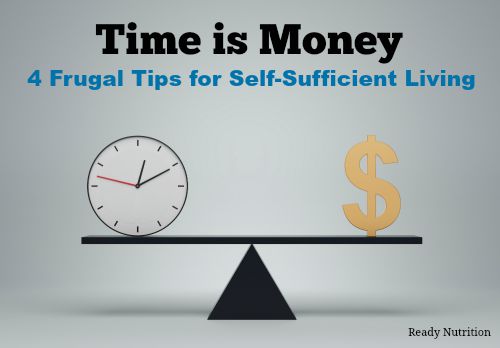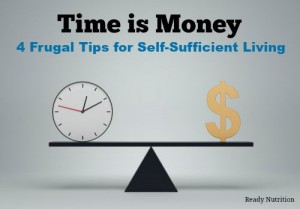If you’re like most Americans, your self-sufficiency skills are on the light side. If you’re like 40% of Americans, you probably don’t even cook dinner at home anymore. There are various reasons for that statistic, but the one most often cited is the lack of time. This is especially true for low income families. It takes a lot of time to be poor, both parents are usually working, and some families hold down more than one job each or have irregular shifts. It’s also stressful to be poor and at the end of a long work day, kids clamoring for attention, and never-ending laundry to be done, it’s no wonder we look for quick, easy, prepared options for our meals.
So where do you start? Maybe you’re already feeling you’re doing as much as you can possibly do and just do not have one more brain cell to dedicate to learning a new skill. And, you know what? You’re probably right. A study published in the journal Science [1] showed that when money is tight, people tend to make poor decisions and eat less healthy than they normally would. This has nothing to do with their intelligence and everything to do with the finite resources of the human brain. Being poor requires a lot of work, even on your brain.

Start With These Frugal Living Tips
The first step is to realize you’re working your butt off and you’re probably doing a pretty stellar job already under the circumstances. Beating yourself up doesn’t help, so let that go. This is your life and you’re the only one who gets to decide how you’re going to live it.
Do you want to improve your life, eat a healthier diet, start a savings account, or just be able to relax once in a while? That’s where becoming self-sufficient comes in. Instead of thinking of self-sufficiency as a way to prepare for the Apocalypse, think of it as a way to free yourself of the poverty grind or at the least, a way to buffer yourself from the damage it does to you and your family.
1. Less is More
It’s time to get brutal. Take a moment to look around your home and think about your possessions. Are they functional? Do they hold significant sentimental value? Are they necessary? If not, get rid of them. Possessions often become the clutter of our lives and represent emotional baggage. Plus, they just plain add to the mess, need to be dusted, polished, vacuumed around, or otherwise take our time. And we already don’t have enough time.
Once you’ve decided what needs to go [2], sort them into three piles: throw-away, sell, and give-away. Items in the throw-away pile should be disposed of as quickly as possible. Take them to the outside trash can or dumpster and get them out of your sight to reduce the temptation to keep them. For the sell items, throw a garage sale or list them on Craig’s List or other online auctions. There will be a few items that you probably don’t need, are still useable, but don’t have any significant monetary value- donate those items. Someone else might need them. One person’s trash is another person’s treasure and by donating, we all help each other out. If there are items that you just can’t decide to keep or put in a pile, place those items in a container or out of sight for a short time to test if you actually need them- odds are you don’t.
2. Follow the Money
When money gets tight or there just isn’t enough of it, it can be very difficult to start a savings account or get ahead, but believe me when I say it can be done. No one can get control of their bills though if you don’t know where your money is going. Start by making a list of all your regular monthly bills. An example might be something like this:
- Rent
- Utilities
- Water/sewer/garbage service
- Phone
- Car payment
- Car insurance
- Netflix (or other TV/movie subscription)
- Credit Cards
Notice how there’s no food, gasoline, entertainment, clothes, or medical on that list? We’ll get to those! Take a look at your regular monthly bills and decide which MUST be kept and which can go or be modified. Can you get a better deal on phone service or a lower insurance rate? Do you really need Cable or Netflix?
If you have credit card debt, it’s important to get those paid off as soon as possible. There are a couple of websites that offer excellent advice on how to get control of your debt: Feed the Pig [3] and The Motley Fool [4].
Once you know what your non-negotiable bills are and have eliminated monthly extras you feel you can live without, it’s time to track your spending habits for the next month. This can be the most difficult part for a lot of people. It’s a pain in the butt to keep every receipt and to track every penny you spend, but this is the only way to know for sure what’s nickel-and-diming you to death. This list is going to include all the things like gasoline and grocery that weren’t contained in the first list and include stuff a lot of us don’t think about like the “treats” we give ourselves (I’m looking at your latte!).
3. Don’t Work for Free – Don’t Get Ripped Off
I want to preface what I’m about to say by cautioning everyone that they need to carefully assess whether or not they can risk the possible consequences of standing up for themselves at their job.
It’s always been more difficult for Broke Folk to stand up for themselves at work, but it seems to have gotten a lot worse since the economy [5] took a dump. In the same way it’s important to know what money is going out, it’s equally important to know what money is coming in. Check your paycheck! We’re being asked to get more done (productivity) than ever before in the same amount of hours and are under constant stress that we could lose our jobs at any moment, which is why it’s become even more important to know your state’s employment laws.
I’m only two weeks into my new job and don’t qualify for paid vacation yet, even though my employer offers it. When I asked about how the benefits work at this company, I was told that everyone is required to use their vacation days by the end of the year or they lose it (known as “use it or lose it”). It doesn’t roll over to the next year and the company doesn’t pay out for unused vacation time. I didn’t think that sounded right, so I looked it up here [6] and found,
“Q: My employer’s vacation policy provides that if I do not use all of my annual vacation entitlement by the end of the year, that I lose the unused balance. Is this legal?
A: No, such a provision is not legal. In California, vacation pay is another form of wages which vests as it is earned (in this context, “vests” means you are invested or endowed with rights in the wages). Accordingly, a policy that provides for the forfeiture of vacation pay that is not used by a specified date (“use it or lose it”) is an illegal policy under California law and will not be recognized by the Labor Commissioner.”
None of the employees that work there knew this was illegal. I was also told that I would be getting a signing bonus for six months and that each month it would be divided between my paychecks. I got my paycheck yesterday and there was no bonus.
So, now I’m kind of in a pickle- do I take my pay stub to my boss and ask about my signing bonus and possibly risk being let go [7] or do I keep quiet and just be thankful I have a job? Like I said, it’s up to each person to decide what works best for them. I’m not keen on working for free, so I’ve chosen to stand up for myself and ask for my signing bonus.
4. A Penny Saved is a Penny Earned
This saying has been around for a long time and most of us don’t give much thought to it. Some years back, I read an excellent article on Northwest Edible Life [8] where the word “negabucks” was used and realized this is what the old saying was all about. Her philosophy centered on her hobby of gardening as a SAHM and if her time spent and the money saved to do it was worth it. By her calculations, she made about $6 an hour.
I soon realized that every dollar I saved by not buying something I didn’t really need, by being self-sufficient and doing for myself instead of paying someone else to do for me, or by reducing my monthly bills was one less dollar I needed to earn working. Suddenly, I had choices and a wonderful sense of control over my life.
So, if you’re one of the Broke Folk and would like a better quality life, start by de-cluttering your home. Get rid of those things you don’t truly need and free yourself of them. If they don’t add value to your life, they own you and your time. Get real about your finances, where your money goes, and how your time is spent. Soon, you’ll find that you have a little more time, a little more money, and a few more brain cells to start taking on some new homesteading skills. Stay tuned!
